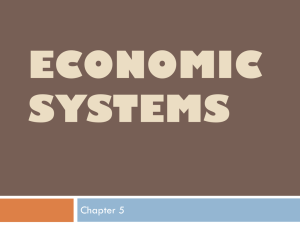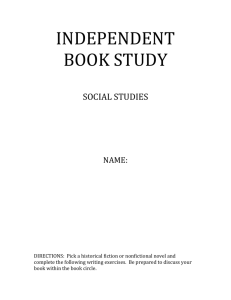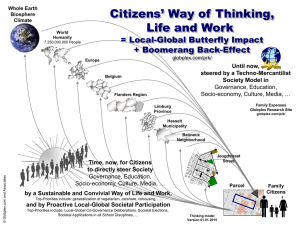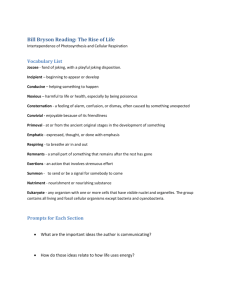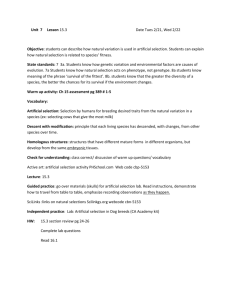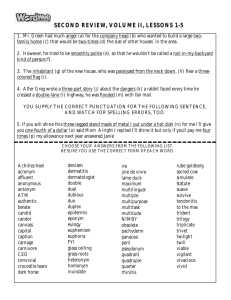Philosophy of Law and Economics
advertisement
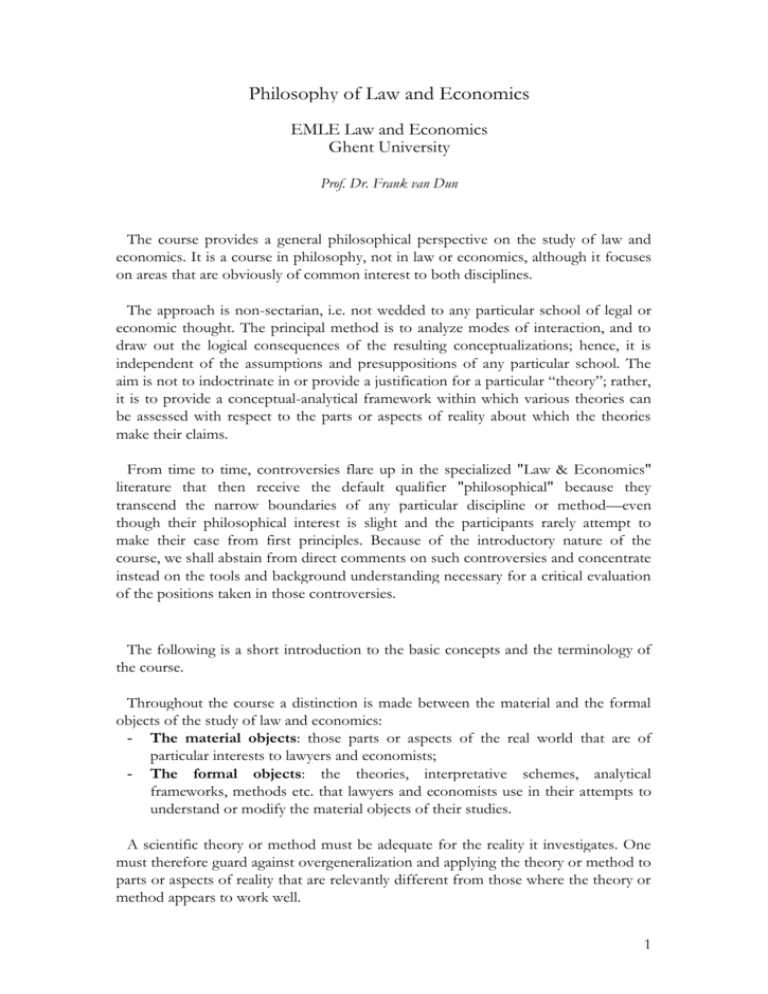
Philosophy of Law and Economics EMLE Law and Economics Ghent University Prof. Dr. Frank van Dun The course provides a general philosophical perspective on the study of law and economics. It is a course in philosophy, not in law or economics, although it focuses on areas that are obviously of common interest to both disciplines. The approach is non-sectarian, i.e. not wedded to any particular school of legal or economic thought. The principal method is to analyze modes of interaction, and to draw out the logical consequences of the resulting conceptualizations; hence, it is independent of the assumptions and presuppositions of any particular school. The aim is not to indoctrinate in or provide a justification for a particular “theory”; rather, it is to provide a conceptual-analytical framework within which various theories can be assessed with respect to the parts or aspects of reality about which the theories make their claims. From time to time, controversies flare up in the specialized "Law & Economics" literature that then receive the default qualifier "philosophical" because they transcend the narrow boundaries of any particular discipline or method—even though their philosophical interest is slight and the participants rarely attempt to make their case from first principles. Because of the introductory nature of the course, we shall abstain from direct comments on such controversies and concentrate instead on the tools and background understanding necessary for a critical evaluation of the positions taken in those controversies. The following is a short introduction to the basic concepts and the terminology of the course. Throughout the course a distinction is made between the material and the formal objects of the study of law and economics: - The material objects: those parts or aspects of the real world that are of particular interests to lawyers and economists; - The formal objects: the theories, interpretative schemes, analytical frameworks, methods etc. that lawyers and economists use in their attempts to understand or modify the material objects of their studies. A scientific theory or method must be adequate for the reality it investigates. One must therefore guard against overgeneralization and applying the theory or method to parts or aspects of reality that are relevantly different from those where the theory or method appears to work well. 1 I. MATERIAL OBJECTS Lawyers and economists study the orderly and disorderly consequences of the interactions of persons (rational agents) * Persons a) Natural persons: examples are you, your parents, friends, acquaintances, etc. – humans beings with the capacity to represent themselves in word and action. b) Artificial persons: examples are the Director, the Treasurer, the Mayor, the Alderman, the Rector, the Dean, the Student – positions in an organization, or the organization itself, which typically lack powers of self-representation and therefore must be represented by natural persons or by agents capable of automatic or programmed action (e.g. mechanical devices, computers, robots, trained animals). * Basic interaction modes c) Speech requires at least two mutually independent natural persons. Hence, ius-relation (from ‘iurare’, to speak solemnly, in a manner of committing oneself). d) Command requires a person and one or more dependent (obedient or programmable) agents, which may be persons. Hence, lex-relation (from ‘legere’, to pick out servants, soldiers, subjects, etc. to commit them to perform some task). e) Force requires a person and one or more physically controllable objects, which may be natural persons. Hence rex-relation (from ‘regere’, to steer). f) Convention requires at least two persons habitually following the same rules. Hence, mores (mos, custom, habit). * Orders a) Law as a material object: a. The general meaning of the word ‘law’ is “order of things”; laws are principles, or patterns of order. Every science of natural things seeks to identify the laws of nature or natural laws of those things. b. In this course, ‘law’ descriptively refers to orders of persons: ‘natural law’ to orders of natural persons, and ‘artificial’ or ‘positive law’ to orders of artificial persons (and to natural persons to the extent that they occupy a position in the artificial order or somehow interfere with the functioning of the order). c. In a prescriptive sense, ‘law’ denotes a respectable order, one that for some reason or another ought to be respected by its constitutive elements. Thus, natural law theory implies that natural persons ought to respect the natural order of natural persons (in particular, of course, the 2 order of the human world, human persons being the only known species of natural persons). Legal positivism posits the requirement that the agents that occupy positions in a social order abide by the rules that define those positions. d. It is a function of reason to discover or propose particular rules and prescriptions that in the circumstances of the case will serve as concrete expressions of what these “oughts” require. b) Economy as a material object: a. Strictly speaking, an economy is an organization that aims to produce goods or services that will ultimately be consumed by its members or exchanged for goods or services produced by other economies. b. However, the usual meaning of the term is nowadays much wider, to wit, any order of exchange (“catallaxy”, for example the market economy). This change of meaning is significant: there may be many organizations in the market, but the market is not itself an organization. The order (“law”) of the market is not something of the same kind as the order a particular organization: ius =/= lex. The common thread in the studies of law and economics is the study of problems of order and disorder (or peace and conflict) in human relations. In particular, five types of order should be distinguished: - the convivial order;* - communities;* - social orders (“societies”);* - societal orders; - state orders. Only the types of order marked with an asterisk will be discussed extensively in the course. The other types are derivative. - The convivial order is an order of natural persons, who have the capacities of purposive action and self-representation. o Elements: natural persons and their property. o Constitutive relation: speech (ius). o Natural persons participate “in person”. The market is a subtype of the convivial order: constitutive relation: exchange. A market without organizations is an order of natural persons. Hence, its laws are natural laws. - A social order (‘society’, German ‘Gesellschaft’) is a purposive organization of artificial persons, who do not have the capacity of self-representation and therefore must be represented by natural persons. A social order is itself an artificial person. o Elements: rule-defined positions, roles, functions. 3 o Constitutive relation: command (lex). Note that the origin of the lexrelation may be speech (as in a contractual social order), habit, or submission to force. o Natural persons participate as functionaries, placeholders. Companies, firms, etc. constitute a subtype of social order. Note that the English language uses the same word ‘society’ to connote both the convivial and the social order. The same is true in many other languages. In Dutch we can distinguish between “samenleving” (convivial order) and a “maatschappij” (society, social order). Some societies separate the public sector from various private sectors, the latter being spheres of interaction in which the occupants of social positions can act with wide margins of discretion, subject only to general legal rules (“applicable to all participants”). The so-called nomocratic sectors are phenomelogically similar to, but essentially different from, the convivial order. (E.g. a company may organize various “internal markets” that in some ways simulate the market as a subtype of the convivial order; nevertheless, such internal markets are essentially different from the general market, for example with respect to the origin of the rights, especially property rights, of participants, forms of dispute resolution, the ability of participants to contract debt and offer collateral, etc.) - A community (German ‘Gemeinschaft’) is an order of interaction among persons who have at least one [durable] thing in common (location, ethnic origin, religion, language, an interest, profession, or hobby, etc.) that is the focus or condition of their interaction. o Elements: natural persons. o Constitutive relation: convention, habit, custom (mores). Note that some communities may be thin (e.g. the community of people who speak English), whereas others are thick (a community of people who have many things in common, e.g. location, ethnic origin, religion, and language). In many communities social entrepreneurs are active who attempt, sometimes successfully, to transform the community into a society. Communities can form within the convivial order and within social orders. In the latter, communities are often regarded with distrust, especially if they create loyalties to values that are separate from those that derive from the organizational goals and membership criteria. - A societal order is an order of persons (natural and artificial), analogous to a convivial order. (Cf. a corporate economy, an international order of states.) Modern markets are societal orders with natural persons and artificial (corporate) persons interacting. It is customary to conceptualize corporate persons as analogous to individual natural persons as far as their “external” actions and relations are concerned. Obviously, their “internal” organization is radically different from that of natural persons. o Elements: persons 4 - o Constitutive relation: speech (ius). This means that natural persons are necessary elements of a societal order, even if they participate only as representatives or functionaries of participating societies. A state is a social organization (“society”) that claims sovereign jurisdiction over other societies and natural persons within the territory under its control. (Cf. a national economy.) o Elements: persons o Constitutive relation: force Note the ambiguity of the word ‘state’: Belgium is a state, but in Belgium, when a reference is made to the state, the usual meaning is a particular social order (the government and its administration) to distinguish it from natural and artificial persons in the societal order under the control of the state. The Belgian State is an element in the international societal order. * Disorders With each of these types of orders correspond characteristic behavioral (a) and consequential (b) types of disorder (or conflict): - - - - - Convivial orders: a) Failure to respect other persons; failure to anticipate actions of others. b) Crimes against persons or their property; violent confrontation; discoordination or incompatibility of the actions of different persons. Communities: a) Deviance from the norms/rules that define the community. b) Fragmentation of community. Societies: a) Failure to respect social hierarchy; disobedience, insubordination. b) Inability to maintain organization or to accomplish social goals. Societal orders: c) Failure to respect other natural or artificial persons, or their property; failure to anticipate actions of others. a) Crimes against persons or their property; violent confrontation; Discoordination or incompatibility of the actions of different persons. State orders: a) Failure to respect the state’s hierarchy; disobedience, insubordination. b) Inability to maintain state organization or to accomplish state goals. Insofar as “Law and economics” is a science, each and every of the abovementioned orders of things, as well as their interrelations, are appropriate material objects. Unfortunately, labor market opportunities for students of “Law & Economics” tend to be mainly (perhaps exclusively) in social orders (states and their subdivisions in particular, and to a lesser extent in large corporations), which have central rule-making, management and adjudication authorities. Hence, both in teaching and in publishing, “Law & Economics” tends to overemphasize the positive law (lex: regulations and 5 their administration) of societies and the management of incentives to further the goals and agendas of such social orders. The convivial order, societal orders, and communities do not have central rule-making, management and adjudication authorities, and are therefore largely neglected. Nevertheless, it is from the study of these non-centralized orders that both law and economics derive most of their fundamental insights. In this course, the broader scientific perspective is adopted. I. FORMAL OBJECTS: The course will focus on two general types of formal objects: - Realism: e.g. natural law analysis, causal economic analysis; - Formalism: e.g. legal positivism, formal (“functional”) economic analysis. In the expression “Law and Economics” both terms may refer to the corresponding material object, the corresponding formal object, or one term may designate a material and the other a formal object (as when Law and Economics is understood as Economic Analysis of Law). Moreover, if the formal object is meant, the question remains whether it is to be taken in a realist-naturalist sense, or in a formalist-positivist sense. - Law as a formal object =Analysis of the structure (elements, constitutive relations) of an order of persons to identify actions that are compatible, or incompatible, with that order. o Natural law analysis pertains primarily to the convivial order (and by analogy to societal orders, as in the Classical Theory of International Law) but secondarily also to communities. Relevant discrimina: just/unjust (with reference to principles of order); moral/immoral (with reference to norms, conventions and rules of conduct). o Legal positivism pertains to social orders and states. Relevant discrimina: legal/illegal (with reference to legislated rules, prescriptions, commands, etc.). - Economics as a formal object =Analysis of the consequences of actions in, or on, or for a particular order. General economics: creating / maintaining / disturbing order. Particular economics (“business administration”): efficient / inefficient goal achievement. o Causal economic analysis pertains to actions of natural persons and their consequences in real time and space; it imposes the requirement that all assumptions used in the analysis must be true. Reality (or “nature”) is for all practical purposes independent of human actions, volitions, etc. Relevant discrimina: coordination / discoordination, harmony-inducing / disharmony-inducing actions. o Formal economic analysis pertains to artificial persons in artificial time and space (“models”); assumptions need not be true, only useful (e.g. capable of generating predictions or statistically testable propositions). No reality 6 is assumed, or if it is, it is assumed to be malleable (i.e. it can be made to conform to the model.) Relevant discrimina: efficiency / inefficiency, optimal / non-optimal. III. ORDER AND DISORDER / CONFLICT Causes and remedies of disorder / conflict Lawyers and economists have a particular interest in interpersonal conflicts (where the persons are natural or artificial persons) The causes or necessary conditions of such conflicts are: - Plurality of persons - Diversity of personal opinions, values, preferences, etc. - Scarcity of means - Free access to the same scarce means Remedies of such conflicts involve reduction or elimination of at least one of the following - Plurality Unity (Leadership) - Diversity Consensus (Conformism) - Scarcity Abundance (Wealth maximization) - Free access Property (De-centralization) Opinions on the desirability and the feasibility of these remedies are varied and often embodied in more or less systematic political philosophies and ideologies. Feasibility of the remedies depends on the type of order that is threatened by conflict and the degree of community among the persons in that order - Society: “political solutions” seek to strengthen the social and in particular the political order: Unity or Consensus; (compare e.g. Plato versus Aristotle; Hobbes versus Rousseau); - Convivial order: “economic solutions” seek to strengthen the convivial and or the societal order: Abundance or Property (compare e.g. Cynics versus Sophists; Marx versus Locke). IV. TOPICS Apart from elucidating the conceptual and analytical framework given above, we shall discuss its application to various more or less general topics that are of common interest to lawyers and economists, such as: - Individual versus collective decision-making: o The Arrow Theorem; o Analysis of collective decision-making procedures (dictatorship, majority voting, representative democracy, etc.) 7 - - - - - - o The (ir)relevance of utilitarian accounts of decision-making in the various types of order Convivial (market) order versus social (company) order: o The “Socialist Calculation Problem” o Teleocratic and nomocratic organizations; spontaneous order o Division of labour in convivial and social orders Responsibility and liability in different types of order o Principal-agent relations in different types of order o “Limited liability” of economic and political societies Justice and efficiency o Coase Theorem and the (ir)relevance of a “Coasian judge” in various types of order o Meaning and relations in different types of order o Compliance with the requirements of order in various settings Reason and force o Supply of and demand for [aggressive or defensive] force o Discovering law versus imposing rules Natural rights versus social rights o Status of natural persons / artificial persons o Theoretical and practical problems of the modern-style “human rights” Etc., etc., etc. 8
